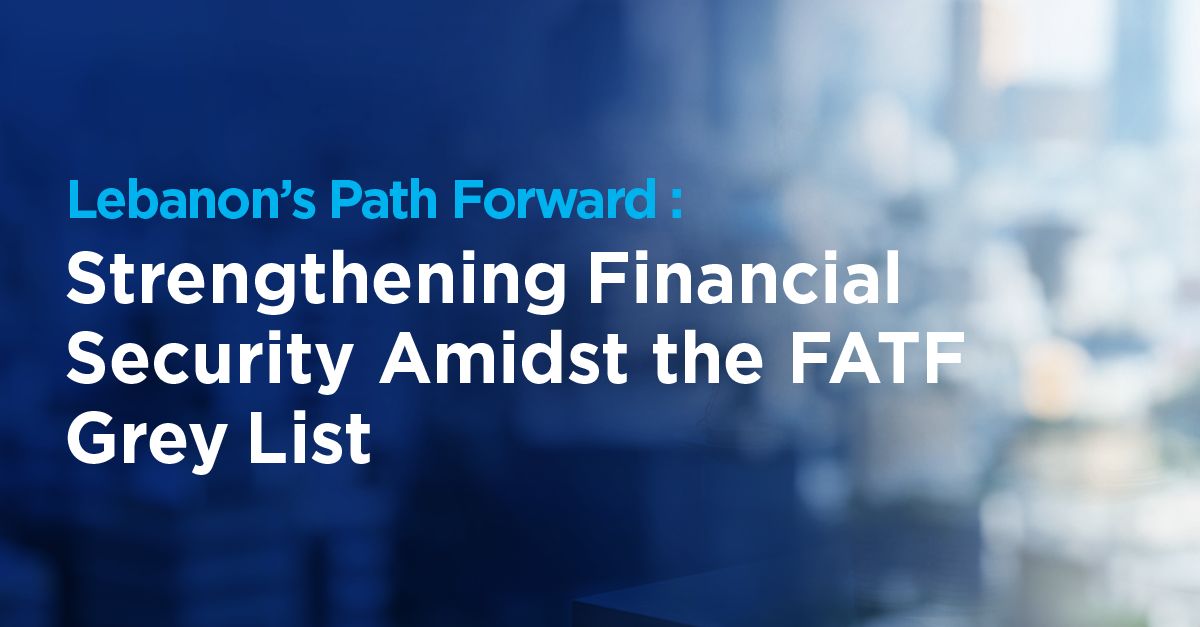Lebanon’s recent inclusion on the Financial Action Task Force (FATF) grey list presents new challenges for individuals and businesses with ties to the country, particularly in managing investments and securing financial transactions. The FATF, an international body established in 1989, sets the global standard to combat money laundering, terrorism financing, and other financial crimes. A country’s placement on the grey list signals strategic deficiencies in these areas and indicates that the nation is actively working to implement necessary reforms.
For Lebanon, this grey-listing does not signal an immediate financial crisis, but it does call for a thoughtful, strategic response. The need for enhanced transparency, compliance, and adherence to global financial principles is paramount. By aligning with international standards, Lebanon has an opportunity to rebuild trust and restore confidence in its financial systems, ensuring that investments remain secure and viable. Understanding how to navigate these complexities is key to ensuring the stability and maintenance of investments during this critical period.
Stakeholders Facing Challenges After Lebanon’s Grey Listing
- Issues for Bank Account Holders and Investors
Lebanon’s placement on the FATF grey list has introduced significant challenges for various stakeholders, notably bank account holders and investors.
For bank account holders, accessing funds can become more complicated due to increased monitoring by banks and financial institutions. These enhanced checks, aimed at ensuring compliance with anti-money laundering (AML) standards—which are regulations and practices designed to prevent income generation from illegal activities— may result in longer processing times for transfers and payments, as well as additional documentation requirements. Additionally, some international banks may choose to limit or even sever relationships with local banks in Lebanon due to the country’s inclusion on the grey list, as a means to mitigate risk.
Investors are also impacted, as the grey listing fosters caution among international partners and creates a more conservative investment landscape which can be concretized through limited access to foreign investment opportunities and increased due diligence requirements. These partners are driven by fears of facing disruptive procedures from authorities responsible for authorizing and supervising investments, or by reputational risks associated with transactions involving Lebanese entities due to the country’s grey list status. Moreover, investors may face higher interest rates or reduced credit availability as lenders reassess their risk exposure. The uncertainty resulting from the grey list status can also lead to market volatility, impacting the stability and appeal of investment opportunities in Lebanon. These conditions can slow down or even prevent investment processes and increase operational expenses as stakeholders work to overcome these stricter regulations.
- Solutions to overcome the challenges
To address the issues from Lebanon’s grey listing, stakeholders should improve compliance with global standards like AML protocols and know-your-customer (KYC) procedures. KYC practices are essential for verifying client identities and understanding their financial behavior, which in turn fosters trust with banks and investors.
Strengthening internal controls is equally important; this involves keeping thorough records of all transactions, supported by documents such as suitable and consistent contracts, invoices, and client identification. These records should be well-organized and accessible for audits, ensuring transparency and accountability during regulatory reviews. These steps not only support compliance but also rebuild international trust, fostering a stable financial environment and encouraging sustainable growth.
While immediate actions can alleviate current difficulties, learning from other countries’ successful exits provides a roadmap for long-term strategies.
From Grey to Green: A Roadmap for Lebanon’s FATF Compliance
Several countries, including Jordan, Panama, Albania, and the UAE, have successfully exited the FATF grey list after implementing key reforms and strengthening their financial systems. These examples provide valuable lessons for Lebanon as it works towards achieving similar success.
Furthermore, South Africa’s exit from the FATF grey list in 2023 offers a valuable roadmap for Lebanon. South Africa was grey-listed in 2020 due to weaknesses in its anti-money laundering (AML) and counter-terrorist financing (CFT) frameworks. However, by strengthening its Financial Intelligence Centre (FIC), enhancing Know Your Customer (KYC) practices, and aligning with global standards like the Arm’s Length Principle and the Substance Requirement, the country managed to rebuild trust and regain compliance. These actions ensured transparent transactions and a genuine economic presence for investments, leading to its removal from the grey list.
For Lebanon, the journey to exit the grey list will require similar comprehensive reforms. Lebanon must consequently enhance its financial intelligence infrastructure, improve regulatory oversight, and establish robust systems for monitoring suspicious activities.
Based on the experiences of other countries, Lebanon could expect to make significant progress within 12 to 18 months as this timeframe reflects the typical period needed for governments to implement regulatory reforms, improve enforcement mechanisms, and demonstrate measurable improvements.
Given the urgency and the potential for international support, a 12–18 month timeline is feasible if reforms are initiated promptly and consistently monitored. As seen in Botswana and Morocco, countries that showed consistent, tangible progress in their action plans during FATF reviews were able to meet the criteria for removal from the grey list within a similar timeframe.
Looking Ahead with Confidence
In this evolving financial landscape, a strategic vision is essential. Lebanon’s grey listing may seem like uncharted territory, but it also opens new paths for those who are prepared. By navigating these changes with foresight and precision, you can turn potential challenges into lasting security and growth. This moment presents a chance to reinforce your portfolio’s future, adapting with confidence in Lebanon or exploring secure options abroad. The key is making informed, decisive moves that will not only protect but empower your investments in a changing world.






